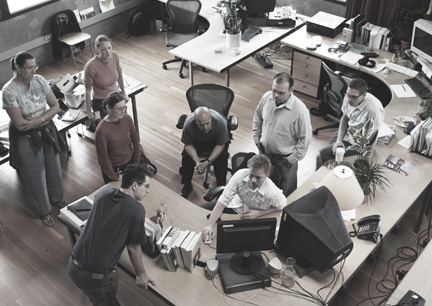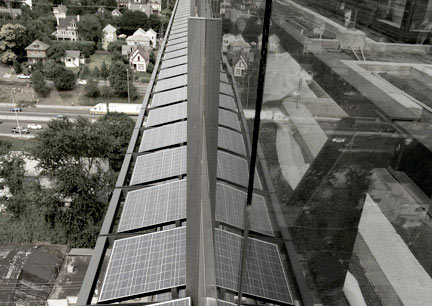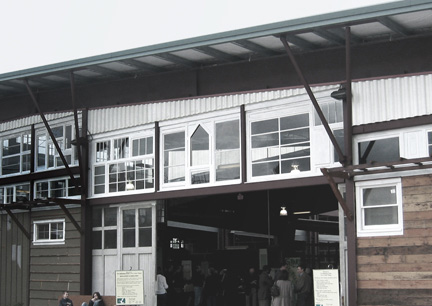The city of Portland stands at the threshold of a new economic era, facing opportunity and challenge in equal measure.
Farsighted investments in transit, land use planning and energy efficiency anticipated the evolution away from carbon-based technologies, and now position Portland as the greenest city in the U.S.
Portland is poised to become the capital of the global green economy, with a growing concentration of firms in clean technology and green building, and a diverse, stable base of leading employers in key industry sectors like apparel and creative services, electronics, advanced manufacturing and health care.
Investments in a universally praised quality of life continue to attract creative class and entrepreneurial talent, the people who maintain a dynamic local economy even in the face of recessionary pressures.
THE CHALLENGE
Despite the city’s leadership in sustainable living, Portland lags in creating jobs.
With the region’s workforce expected to grow at 2.4% annually – about six times faster than in the nation as a whole, even in the face of job declines – the need for job growth will become even more pressing.
Job growth requires explicit investments in the fundamentals of economic development: retaining and growing firms, training workers, funding innovation, developing catalytic projects. While Portland’s legacy investments in lifestyle will pay economic dividends, the emphasis must shift to investment in economic development to realize those benefits. And that shift requires a fundamental rethinking of how the city funds economic development, moving from a thin, unreliable stream of inadequate year-to-year funding that fails to measure up to competitor cities, to more generous, long-haul revenue sources, flexible tools and strategies.

THE GOAL
Portland’s economic future lies in its greatest strength, the sustainable way of life that has been meticulously cultivated over the past 40 years.

With an existing concentration of firms in clean technology and sustainable industries, years of recognized leadership in all facets of sustainable living, supportive state and local policy environments, and the solid foundation of a trade-focused economy, few cities, if any, are as well positioned as Portland to lead the global green economy.
In its quest for international leadership, Portland will create 10,000 jobs within the next five years.
In a sustainable economy, people live and do business in ways that are good for the economy, the environment, and for communities. Businesses are more efficient, innovative and competitive internationally. The local talent pool is deeper. The social and environmental vitality produced by a sustainable economy creates healthy communities and opportunities for residents to prosper.
THE STRATEGY
Building a sustainable economy requires equal focus on:
- Generating robust job growth by maximizing the opportunities to produce and sell products and services for existing, emerging and relocating businesses
- Maintaining a leadership position in sustainability by constantly striving to produce an innovative urban setting that fosters creativity and invention
- Achieving broad-based prosperity by stimulating economic activity in neighborhoods throughout the city
The three components of the strategy overlap in many ways: effective workforce development increases employment opportunities for neighborhood residents; innovation from local projects morphs into expertise that can be sold abroad by Portland businesses; successful neighborhood-based businesses can access national and international markets and drive traded sector job growth.
COMPETITIVENESS
Traded sector firms produce quality jobs. Portland intends to maximize the opportunities for these firms by expanding exports, supporting the innovation efforts of higher education institutions, and aligning workforce development to match the skill needs.

Portland will focus its resources on enhancing the competitiveness of firms in the Clean Tech and Sustainable Industries, Activewear, Software, and Advanced Manufacturing sectors and seeks to grow the share of employment in these sectors from 13% to 18% of all city jobs in five years.
URBAN INNOVATION
Portland will embark on the next generation of innovation and investment in green building, including the construction of the first commercial living building in the U.S., and will complement those investments with equal attention to the quality of the downtown experience for arts, culture and retail.
NEIGHBORHOOD BUSINESS VITALITY

The city will achieve broad-based prosperity by stimulating economic activity in neighborhoods throughout the city. Customized assistance will be targeted to small businesses with particular promise to create jobs and expand into new markets. Portland will focus on strengthening neighborhood commercial districts with the potential to create 20-minute neighborhoods, where residents have reliable access to goods and services.
ALIGNMENT
The success of this ambitious strategy requires alignment of goals and funding priorities between organizations and across jurisdictions, as well as a reinvention of the way Portland funds economic development. The city will collaborate with public and private sector partners throughout the region to implement the actions recommended by the strategy
Effective funding for the strategy should provide multi-year operating support for key initiatives, debt products to finance the growth of existing businesses, investment capital for start-up and emerging businesses, strategic investment funds to jump-start new programs and facilitate collaboration, and regulations and policies that provide financial incentives to businesses.
Only 2.2% of all public expenditures in Portland are allocated to economic development. Portland lags its peer cities in economic development spending.
More information: